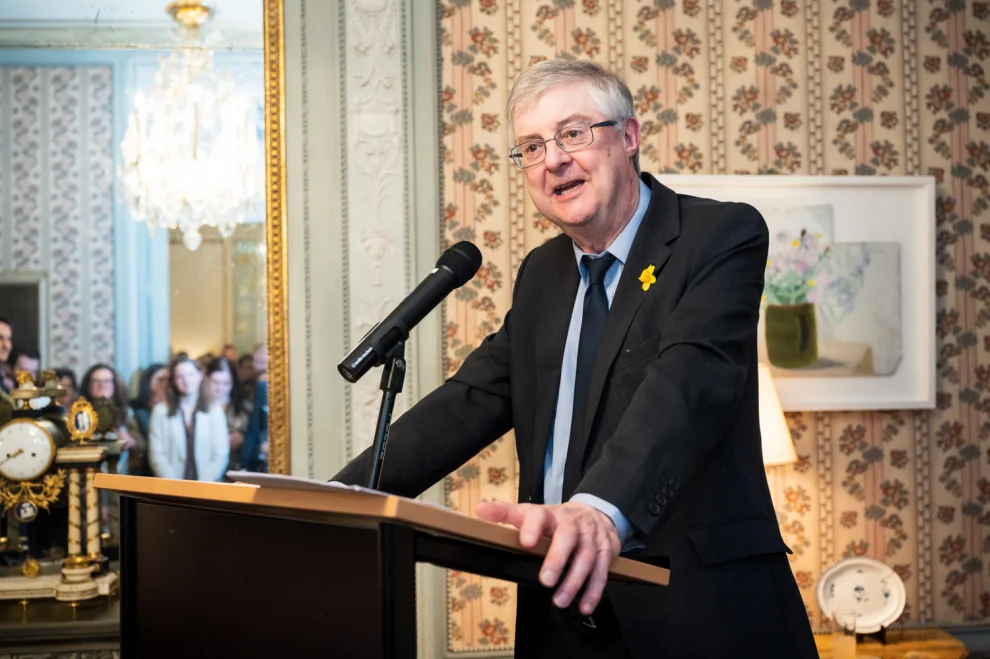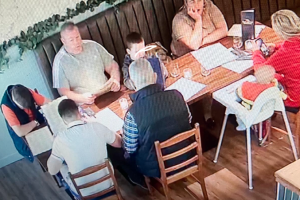THE WELSH GOVERNMENT has revealed that they have reached an agreement with Plaid Cymru to work together in the Senedd for the next three years.
It will address 46 issues, including free school meals for all primary school pupils, “immediate and radical” action to address the second homes crisis, and reform of the Senedd increasing the number of members from 60 to between 80 and 100.
The deal also covers plans to expand free childcare to all two-year-olds, and changing school term dates and school hours are also covered in the agreement.
There is also optimism for the creation of a publicly-owned energy firm for Wales, as well as investment in flood defences, new measures to strengthen the Welsh language and mental health care for young people.
The agreement stipulates that the number of second homes, as well as holiday homes, would be capped.
On Saturday, November 27, Plaid Cymru members will have the opportunity to vote on the agreement. The plan will go into effect on December 1 if it is approved.
The agreement will last three years but is not a coalition. No Plaid Cymru members will join the Welsh Government as ministers or deputy ministers.
Plaid Cymru will instead appoint a designated lead member for the agreement, as well as committees composed of Welsh ministers and Plaid Cymru chosen members. The agreement only applies to certain locations.
First Minister, Mark Drakeford, said: “The Welsh Government has an ambitious programme for government, which it will deliver over this Senedd term but we do not have a monopoly on good ideas and we will work with progressive parties where we have shared and common interests to benefit people in Wales.
“This co-operation agreement brings the Welsh Government and Plaid Cymru together to respond to some of the most pressing issues facing Wales today, such as climate change and the energy and cost-of-living crisis.
“We can achieve more for people in Wales by working together and the co-operation agreement is both a response to the external challenges we face and a chance to build on the opportunities in our future. It will also help us secure a stable Senedd over the next three years, capable of delivering radical change and reform.
“These commitments build on our shared values of social solidarity, a sustainable planet and a vibrant democracy.”
Plaid Cymru leader, Adam Price, said: “The challenges we face require real ambition to deliver radical ideas. The fallout from leaving the European Union, the legacy of the pandemic, and the UK Government’s determination to erode the Senedd’s powers all increase the need for transformational change.
“Taken together, the bold policy pledges will unite Wales and benefit every generation, from all primary school pupils receiving free school meals to a national care service, free at the point of need.
“I am pleased this pioneering co-operation agreement is founded on common ground on a range of issues that will make a long-lasting difference to people’s lives.”
The areas where the two parties will work together are:
- Extend free school meals to all primary school pupils
- Expand free childcare to all two year-olds
- Set up an expert group to create a National Care Service, free at the point of need by the end of 2023
- Increase Senedd to between 80 and 100 members with a voting system which is as proportional – or more –than the current one and has gender quotas in law. A Senedd reform Bill 12 to 18 months after a Special Purpose Committee reports back
- Reform school term dates and reform the rhythm of the school day to create space for more wide-ranging, culturally accessible activities and opportunities
- Take immediate and radical action to address the proliferation of second homes and unaffordable housing, using the planning, property and taxation systems. Actions being planned include a cap on the number of second and holiday homes
- Establish a national construction company, to support councils and social landlords to improve the supply of social and affordable housing
- Significantly reform the current system of building safety
- Publish a White Paper to include proposals for a right to adequate housing and new approaches to making homes affordable.
- End homelessness. If people are made homeless it should be brief, rare and unrepeated.
- Reform council tax
- Explore how to set meaningful targets to increase Welsh public sector procurement
- Introduce local tourism levies using local government finance reform legislation
- Look at bringing forward the net zero by 2050 target to 2035
- Work towards the creation of Ynni Cymru, a publicly-owned energy company for Wales, over next two years
- Ask Transport for Wales to explore the development of transport links between North and South Wales
- Agree biodiversity targets and environmental governance body
- Work with the farming community to encourage woodland creation on less productive land and through agroforestry
- Work with farmer to improve water quality and air quality
- Commission an independent review into extreme flooding in winter 2020-21
- Invest more in flood management and mitigation and plan to respond to the increased risk of flooding
- Introduce a transition period ahead of farm payment reform
- Support the work of the Independent Commission on Wales’ Constitutional Future
- Explore the creation of a shadow Broadcasting and Communications Authority for Wales
- Fund existing and new enterprises to improve Welsh-based journalism to tackle the information deficit
- Address inequalities between poorer and richer parts of the country by building on the Arfor pilot, which promoted entrepreneurship, business growth, community resilience and the Welsh language
- Explore how setting up a National School for Government might contribute to the principle of a One Wales Public Service
- Keep regional partnership working under review, together with local government partners
- Work with the Wales Governance Centre, the Office for Budget Responsibility and others to understand devolved public finances and the future needs of Welsh public services.
- Work with partners to develop options for a more sustainable model of supply teaching and put in place a framework to remove profit from the care of looked after children
- Reform qualifications
- Take forward the Tertiary Education and Research Bill
- Develop a new culture strategy and develop the proposals for a national contemporary art gallery.
- Improve the teaching of Welsh history
- Promote the daily use of the Welsh language in more places
- Introduce a Welsh Language Education Bill
- Work with the Welsh Language Commissioner to reduce obstacles in setting Welsh Language Standards
- Ensure Welsh language place names in the built and natural environments are safeguarded and promoted
- Invest in Coleg Cymraeg Cenedlaethol and the National Centre for Learning Welsh to increase the proportion of Welsh-medium apprenticeships and further education and provide free Welsh language learning for 16 to 25-year-olds
- Increase the ability for learners from disadvantaged backgrounds to take part in the Seren Network
- Support the devolution of the administration of welfare
- Test how community facilities run by trained third sector staff with clear referral pathways into NHS services if needed – the sanctuary model – can help support young people in crisis or with an urgent mental health or emotional wellbeing issue
- Strengthen the rights of disabled people
- Tackle institutionalised and systemic racism
- Make Wales the most LGBTQ+ friendly nation in Europe
Many people have argued that this plan is unaffordable, fearing that this plan may result in higher taxes for people living in Wales.
People have also argued that this plan should be stretched to accommodate all school pupils, not just those in primary school.
However, others have expressed support for this new plan, claiming that the Welsh Government are setting the standards for the rest of the UK.
Many people have said that they are more than happy to pay an increase in taxes to help fund this new deal.

















